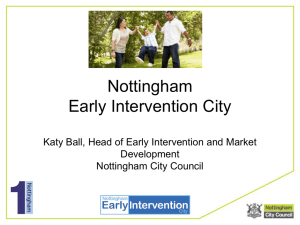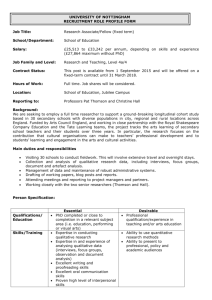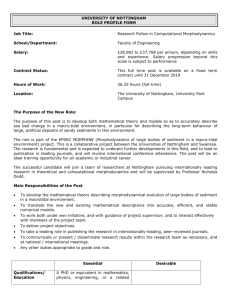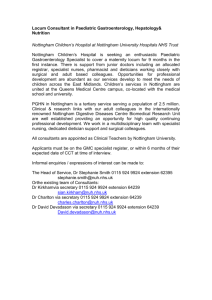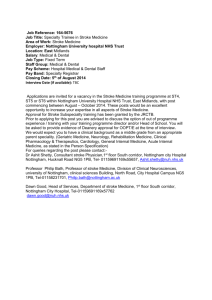Jaspal Kaur
advertisement
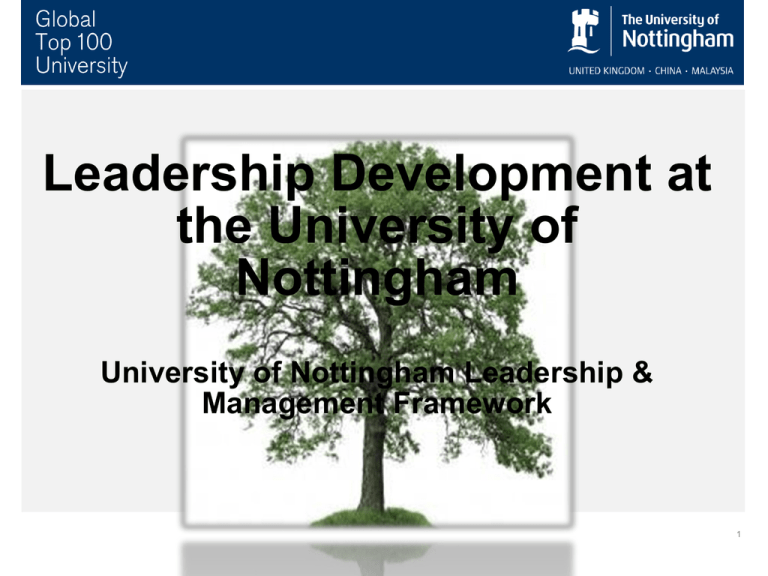
Leadership Development at the University of Nottingham University of Nottingham Leadership & Management Framework 1 Overview • University of Nottingham Context • Drivers for change • Leadership Framework • Challenges & Issues 2 A little about University of Nottingham Challenges in Managing International Universities 3 A Little about University of Nottingham • Campuses in UK, China & Malaysia • 8100 staff • 43,561 students • 5 Faculties, 32 Schools • Research led Russell Group University • Excellence in Teaching • 93% UG & 90% PG in employment of study 4 The Strategic Importance of Leadership External factors • Changes in student funding resulting in increased competition for students. • Transformation of students into paying customers • Impact of League Tables on positioning in the sector • Global competition Internal factors • REF exercise determines funding • Workload modelling – determines resources • Performance – persistent non management • National Student Survey – improvement in student experience at Nottingham is slower than other Universities, has an impact on league tables • International leadership – leading staff in China and Malaysia 5 The Strategic Importance of Leadership • The University’s staff are the basis of our success. We attribute much of our success to the quality of our academic, administrative and support staff. The scale of our ambition means that, more than ever, we need to attract, retain and motivate staff of the highest calibre. • Optimising management effectiveness. For the foreseeable future, successful universities will be distinguished by their underlying, continuous and measurable improvements in efficiency, productivity, effective cost control, and informed, skillful and well supported management at all levels. (extract, University Plan, 2010 – 2015) 6 Leadership & Management Development Framework - Principles • A progressive approach which recognises that development support is required from the moment potential leadership talent is identified through to the most experienced and senior leaders. • Leadership development is an on-going process which leaders return to at different stages of their career. • Leadership development activity is differentiated for different groups and individuals. • Leadership occurs at all staff levels and is fundamental to successful activity. • Future leadership potential is nurtured by the framework 7 The Leadership and Management Development Framework Level 7 + Levels 6 - 7 Levels Levels 1-4 4-6 Newly Appointed Head of School Senior & Executive Leadership Newly appointed Professors and Directors Future Potential Preparing for Senior Leadership Manager and Leader Practitioner Emerging Managers and Leaders 8 Leadership & Management Development Framework - Themes Planning and Resource Management Builds Strategic Capability and Capacity Makes a Personal Impact Change Leadership Leads and Manages People 9 The Leadership and Management Development Framework Level Preparing for Senior Leadership ( 6-7) Description You may become a Professor, be selected to become the next Head of School, or take on significant management and leadership responsibilities within a School or Professional Services Department. Required •Recruitment, selection, induction and development of your team •Conducting effective PDPR Reviews. •Financial management •Planning and implementing successful organisational change Optional •ILM (level 5) First Line Manager •Leadership coaching •Mentoring •Action learning •360 degree feedback •Relevant external programmes, such as the Leadership Foundation’s ‘Preparing for Senior Strategic Leadership’ 10 The Leadership and Management Development Framework Level Future Potential (usually level 6) The future potential programme is designed to support those staff who are at a senior level but are yet to take on leadership responsibilities. Future potential supports potential through •Leadership Potential 360 feedback •Support from a leadership coach •Input from current leaders in the University •Encouragement to draw up a development plan to support an identified career pathway 11 The Leadership and Management Development Framework Level Future Potential (usually level 6) The future potential programme is designed to support those staff who are at a senior level but are yet to take on leadership responsibilities. Future potential supports potential through •Leadership Potential 360 feedback •Support from a leadership coach •Input from current leaders in the University •Encouragement to draw up a development plan to support an identified career pathway 12 The Leadership and Management Development Framework Level Newly appointed Professoriate and Directors of Professional Services Leading at Nottingham Module One – The role of a leader at Nottingham Module Two – Making the strategic operational and working the finances Module Three – Managing and Leading People towards High Performance “... the University expects senior staff to also be active and engaged leaders who contribute to the wider University and take steps through this programme to hone their leadership skills and knowledge and be willing to apply these attributes in a variety of ways which go beyond their immediate role and department.” 13 The Leadership and Management Development Framework Level PVCs, Asst PVCs, Deans of Faculty, Heads of School (7+) Description Senior management and leadership role; a Head of School, Dean, Director of a Professional Service, Assistant PVC, PVC Required During your first 12-24 months it is expected that you will: •Engage in ongoing leadership development, e.g. working with a coach • 360 appraisal • Develop your senior team •Self-assess your capabilities against the critical success factors for leaders at level 7 and discuss at your PDPR • International assignment (PVC’s) Optional •Executive/Leadership Coaching • Mentoring with a senior member of staff from outside of HE • Action learning and 360 degree feedback • Developing a high performing senior team • Relevant leadership development activities, such as ‘Leadership Exchange’ or CPD events with Birmingham • Other relevant external programmes such as the Leadership Foundation’s ‘Top Management Programme.’ 14 The Leadership and Management Development Framework Level Newly appointed Heads of School The First Hundred Days Induction Programme •Understanding of the University expectations of a Head of School •Provision of practical information about who, where and how to get assistance in order to get things done. •An understanding of the annual cycle of activities for which a Head of School has overall responsibility •Strategic thinking and making plans operational •Pragmatic development in some key aspects of leadership including awareness of transition and change issues and leading people towards high performance. •The role of the School Senior Management Team 15 Additional Support • Mentoring – a range of senior mentors are being trained to support leaders at various stages in their career. These range from current senior leaders, ex-Heads of School, external stakeholders and a shared scheme with the University of Birmingham • Coaching – leadership coaches are employed by the University from a range of sectors to enable leaders to develop under the guidance of an independent leadership expert • Sabbatical - a year sabbatical is made available for all rotating Heads of School/Deans/PVCs to enable them to refocus their academic careers after a period of leadership • Funding – funding is made available to so leaders can maintain their research during their period of leadership. • Leadership Conferences – workshops and forums 16 Some Unique Opportunities •Relationship with the University of Birmingham – leadership shadowing and shared mentors •Development of distinct alternative programmes within the framework •Research Leadership Programme – a programme which identifies and develops the responsibility of leading researchers to provide direction and strategy to research in their School, Faculty and the University •Teaching Leadership Programme – distributing responsibility for managing and improving teaching across a wider range of staff •Sim-Uni – a group based activity to enable participants to lead the University and be scored on their success or failure 17 Challenges & Issues •Vice Chancellor commitment to the leadership agenda •Recruit academics based on research •Rotating nature of leadership roles •Requirement for leaders and managers to undertake development will therefore create some resistance and criticism •Resource issues as elements of the framework are supported externally •Ensuring the credibility and content of the programmes for a senior and often very experienced audience •Making sure the framework is flexible so it can be developed to meet changing needs 18 Issues around Leadership Recruitment Development Reward Leadership Succession Promotion 19 Challenges & Issues Thank You 20



